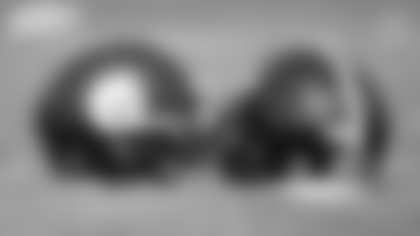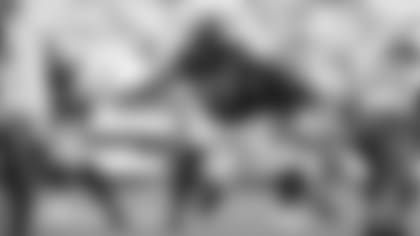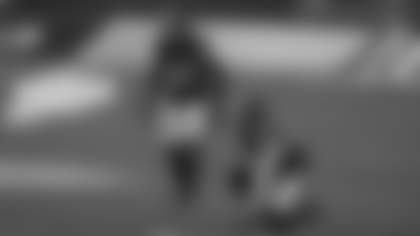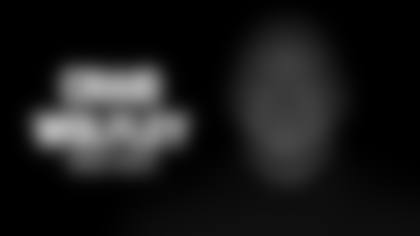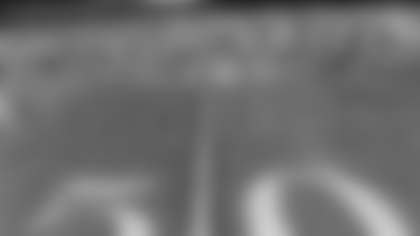Ready or not, here it comes:
It begins with a series of quotes, many of which qualify as testimonials, but they're done without seeing the speakers' faces. Some of those speaking are sufficiently famous to be recognized by the sound of their voices. Then a face fills the screen, and the opening closes with his words:
"When you get on that field, you got no friends … I don't need to smile just to make you comfortable."
And so, it begins. NFL Network's "A Football Life: James Harrison."
There are few things NFL Network does as well as these hour-long biographies of some of the best and/or most interesting individuals who have made the National Football League the premier professional sports league in America, and the episode on James Harrison is one of its best.
During the broadcast, narrator Josh Charles mentions that Harrison is cast as both a hero and a villain, but what also comes across are the genuine emotions from the people who sat down in front of the camera and talked about the star of this show.
There is a testimonial about Harrison's grit and talent and how he personifies what it means to be a Steelers linebacker and a professional football player who plied his trade in Pittsburgh, and it comes from Bill Cowher, the Hall of Fame coach who cut him three times. There is a bit from Joe Thomas, who spent two weeks of every season of his career as a left tackle with the Cleveland Browns going mano-a-mano with Harrison, who admits Harrison was an "intimidator." Troy Polamalu, his Hall of Fame defensive teammate, said, "James played with a supernatural grit. When James was at his best, I've seen him do some absolutely supernatural things. Who does those kinds of things?"
Who does? James Harrison does. The guy from Coventry High School in Akron, Ohio, who got into some mischief that resulted in him getting no major college scholarship offers despite being good enough to have several; who wasn't invited to the NFL Combine; who wasn't drafted by any NFL team: who was sent to play in NFL Europe; who was cut four different times; who refers to himself as "self-destructive."
"James wore all that on his sleeve," said Mike Tomlin. "He used it as fuel."
NFL Network uses footage to chronicle the lineage of Steelers linebackers who had personas as tough guys, from a snarling Jack Lambert to a shot of Greg Lloyd wearing his trademark gray T-shirt with the slogan "I wasn't hired for my disposition" stenciled on the back. The next shot is of Harrison, who says, "I don't know if I have any Lambert in me. I know I have some Mildred and James in me … my mom has a mean streak."
Mildred and James are Harrison's mother and father, and viewers are introduced to Mildred Harrison early in the episode. She is seen sitting next to her son, and as they banter back and forth, it's immediately clear where James got his attitude.
James explains that his sister once brought her children to stay with their grandmother for a time "to get taught," and it's clear he's referring to discipline. When asked what his mother taught him, James responds, "Don't take no sh--. Don't take no sh—from nobody."
Then Mildred explains in her own words. "I teach my children not to bully, but if someone hits them to hit back." Then James says, "A lot of people take kindness for weakness."
James Harrison took his mother's words to heart on every football field he walked onto as a professional He took no sh--, and he took no prisoners, either. "My objective when I tackled someone was, I wanted to put him out of that game. I didn't want to injure him, but I wanted him to hurt … he could come back and play next week."
Harrison himself explained why he was cut the first two times he tried to make the Steelers roster. By his own admission, he didn't know what he was doing on the field, and so he would just stop. Stop running, stop playing, just stop. One time he said he walked off the field and told the coaches he didn't know what he was doing.
And along the way, Harrison acquired a couple of nicknames that were given to him by his teammates.
"Two-day vet" came about "because he had only been (in camp) two days but was acting like a veteran." And then there's the nickname Harrison carries to this day: Deebo. Brett Keisel explained: "His persona and the image he has completely reflects the character from the movie, 'Friday.' That Deebo guy. The bully. So, we started calling him, Deebo."
Harrison talks about being faced with the end of his football career after he was cut for a fourth time and resigned himself to getting a normal job where he would work "40, 50, 60 hours a week." And how he was given a final chance at the NFL thanks to Clark Haggans injuring his hand on the eve of training camp in 2004 and the Steelers calling because they were desperate for a camp body.
Then came the pregame, on-field fight between Browns fullback William Green and outside linebacker Joey Porter during the 2004 regular season, which gave Harrison his first NFL start. How Harrison played well in that game and cemented his roster spot with excellence on special teams. Then came the 2007 season when Porter signed with Miami to create a permanent opening in the starting lineup, which Harrison parlayed into a 2008 season during which he was voted NFL Defensive Player of the Year and capped it all off by authoring the greatest play in Super Bowl history.
"Hard work pays off," said Keisel. "He was seriously the best player … in the game."
Harrison's interception and 100-yard return for a touchdown in the waning seconds of the first half of Super Bowl XLIII against Arizona is covered from all angles, with commentary from many of the men involved in the play. Naturally, the topic comes around to the play's place in history, and two comments stand out.
The first was from Harrison himself, who gave it up to Franco Harris for the Immaculate Reception being the greatest play in NFL history, but then he threw out, "But when it comes to Super Bowl history …" The second statement came from Dick LeBeau, a Hall of Fame cornerback for the Detroit Lions and the Steelers defensive coordinator that day, who had a 59-year career in the NFL as a player and coach: "It's the greatest defensive play I've ever seen."
The final chapter of this "A Football Life" deals with James Harrison's interrupted retirement when some of his Steelers teammates asked him to come back and help them out and the role his two sons, Henry and James, played in that decision; being cut by the Steelers and then signing with the New England Patriots; and how the man who had a disdain for the media now makes a living as an actor in "Heels" playing the role of a character named Apocalypse.
"My greatest accomplishment hasn't happened yet," said Harrison. "I'm trying to raise two boys to become men."
It's somewhat appropriate that Joey Porter checks in with a final thought regarding James Harrison's legacy: "He wants to be remembered as a badass, and I think he did that."










